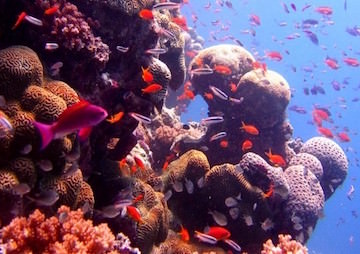Studies of Two Reefs Reveal They May Be Damaged Beyond Recovery
The Pacific Ocean's Great Barrier Reef and reefs of the Maldives in the Indian Ocean may never overcome the effects of global warming, scientists say.
By Tim Radford / Climate News Network

Scientists warn that it is only a matter of time before the Great Barrier Reef suffers a fourth episode of mass coral bleaching. (Richard Ling / Flickr)
The Great Barrier Reef, one of the wonders of the Pacific Ocean, may never fully recover from the combined effects of global warming and an El Niño year, according to a new study in one of the world’s leading science journals.
And a second study, in a second journal, warns that increased sea surface temperatures have also caused both a major die-off of corals and the collapse of reef growth rates in the Maldives, in the Indian Ocean.
Corals are very sensitive to ocean temperatures, and in unusually hot years – and these have recurred naturally and cyclically since long before humans started burning coal, oil and gas, to accelerate the build-up of greenhouse gases in the atmosphere – the corals react to stress by bleaching. That is, they eject the photosynthesising algae that live with them in symbiosis, to the advantage of both creatures.
But the world’s oceans are becoming hotter anyway, because of global warming driven by greenhouse gas concentrations in the atmosphere. The seas are becoming ever more acidic as atmospheric carbon dioxide reacts with the water.
And the periodic return of a blister of oceanic heat in the eastern Pacific called El Niño – Spanish for “The Child”, because it becomes most visible around Christmastime – has begun to put the world’s reefs at risk. The El Niño of 2015-16 triggered a massive episode of bleaching throughout the tropics. And, Australian researchers say in Nature, the bleaching continues.
“We’re hoping that the next two to three weeks will cool off quickly, and this year’s bleaching won’t be anything like last year. The severity of the 2016 bleaching was off the chart,” says Terry Hughes, of Australia’s Centre of Excellence for Coral Reef Studies, at James Cook University in Queensland.
“It was the third major bleaching to affect the Great Barrier Reef, following earlier heatwaves in 1998 and 2002. Now we’re gearing up to study a potential number four.
“We have now assessed whether past exposure to bleaching in 1998 and 2002 made reefs any more tolerant in 2016. Sadly, we found no evidence that past bleaching makes the corals any tougher.”
Researchers have already warned that, unless there is urgent action to limit global warming by drastically reducing dependence on fossil fuel as an energy source, severe bleaching could damage 99% of the world’s coral reefs.
The reefs are among the richest ecosystems on the planet, and they provide vital coastal protection for human settlements as well as a source of sustainable protein for human economies.
“It broke my heart to see so many corals dying on northern reefs on the Great Barrier Reef in 2016,” says Professor Hughes. “With rising temperatures due to global warming, it’s only a matter of time before we see more of these events. A fourth event after only one year is a major blow to the Reef.”
British scientists saw much the same devastation from the same El Niño bleaching around the Maldives in the Indian Ocean, they write in Scientific Reports journal. And the big question now is: how quickly can the Indian Ocean reefs recover?
“Recovery from similar past disturbances in the Maldives has taken 10-15 years, but major bleaching events are predicted to become far more frequent than this. If this is the case it could lead to long-term loss of reef growth and so limit the coastal protection and habitat services these reefs presently provide,” says Chris Perry, professor of physical geography at the University of Exeter, UK.
“The most alarming aspect of this coral die-off event is that it has led to a rapid and very large decline in the growth rate of the reefs.
“This in turn has major implications not only for the capacity of these reefs to match any increases in sea-level, but because it is also likely to lead to a loss of the surface structure of the reefs that is so critical for supporting fish species diversity and abundance.”
Your support matters…Independent journalism is under threat and overshadowed by heavily funded mainstream media.
You can help level the playing field. Become a member.
Your tax-deductible contribution keeps us digging beneath the headlines to give you thought-provoking, investigative reporting and analysis that unearths what's really happening- without compromise.
Give today to support our courageous, independent journalists.






You need to be a supporter to comment.
There are currently no responses to this article.
Be the first to respond.